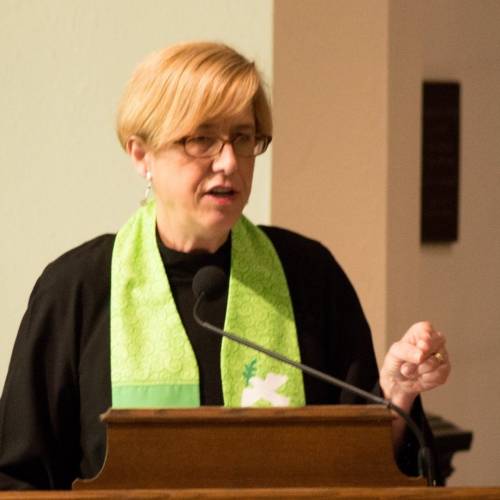Whose fault is it?
Blame has no place in the Kingdom of God
By Susan Rothenberg

It’s tempting to point a finger when a church declines.
Whose fault is it?
When a congregation reaches the end of its life, whose fault is it?
A pastor who kept putting off retirement, and as he lost energy, so did the congregation?
A music director who refused to play any hymn composed after 1940, so people left the church to sing praise music at the shiny new stadium church down the road?
A session who was afraid to ask for larger pledges, so they blew through the endowment to keep the lights on?
A denomination who approved controversial changes to the Book of Order, prompting loss of membership, the withdrawal of per capita dollars, and decreased giving for mission?
Whose fault is it?
One of the hardest issues to overcome when we work with churches who are stressed out and anxious about their future is convincing them that they are not alone and, most often, the situation they are in is a result of larger forces over which they have absolutely no control. Mainline denominations like ours are all freaking out in one way or another as membership declines and the environment in which we do ministry becomes more challenging.
The institutional freak out reminds me of the story in the Gospel of John in chapter nine, in which the disciples encounter a man who was blind since birth, and their first question to Jesus is “Whose fault is it? Who sinned here, the man or his parents?” And Jesus says, “It’s nobody’s fault. It’s about God’s purpose and God’s plan.”
You know the rest of the story. Jesus spits on the ground, makes a mess of mud, and smears it on the man’s eyes. At the end, the blind man can see and instead of rejoicing, everybody wants to know the trick that healed him so they can add it to their list of best practices.
I mean, if you and I could figure out a way to manufacture that mud and put it in bottles, the world would beat a path to our church door, right?
Alas and alack, there is no secret formula for church growth to be found in this story. All the man can say is, “I dunno. I don’t know how it happened, but Jesus did it with mud and spit.” Which, if you think about it, is pretty honest testimony about the power of God and the unexpected ways in which the Holy Spirit defies our processes, practices and expectations. None of us knows, really, how God works. Even when we admit God works in mysterious ways, we still behave as if we can pin down, codify, and explain the Spirit’s movement in the world.
The blame game is a popular human response to deep challenges and major screw-ups, but the way of Jesus calls us to something quite different.
While we always need to seek wisdom from our big fat failures and be mindful in our discernment, the way of Jesus calls us to trust that God’s works are revealed even in a time of great anxiety and decline. Instead of finding fault in our past or even in our present, we are called to work the works of God while it is day, and the light of the world still shines for us, as long as we are alive.
I will warn you, though. People will think you’re all sorts of crazy if you purposefully move through church life acting as if you actually believe all of our present sufferings are nothing compared to the greater glory that is coming.
Maybe you think I’m crazy in saying that the closing of some churches (even if it’s your church or my church) is a blessing if it means our remaining resources will be directed in ways that magnify the Kingdom of God in all its new and emergent forms.
Maybe you think I’m crazy in saying that a declining membership is a blessing if it means a smaller, leaner church will work harder to get closer to our communities, more creative in our ministries, and more courageously prophetic in our public speech.
Maybe you think I’m crazy in saying that the growing number of “Nones and Dones” is a blessing because we will be forced to decide if our faith lies in institutions (which Nones and Dones largely reject) or in relationships (which was the focus of Jesus’ ministry on earth, and something that Nones and Dones care much more about).
I don’t remember Jesus ever saying anything about making members IN a church, but he did have quite a lot to say about going OUT and making disciples.
And you will most certainly think I’m crazy in saying that I’m not at all worried, anxious, or fearful about what will happen to the PC(USA). I am not blind to our challenges, but I am entirely confident that nothing we do or leave undone will thwart God’s intentions one iota. When we stop looking for who’s at fault, and stop blaming ourselves or each other, we might see through the eyes of a formerly blind man with mud on his face, who received a sudden and deep understanding of God’s power along with his eyesight.
Can we let go of the idea someone is to blame when church life becomes difficult? Can we believe God will redeem even our worst missional missteps? This is both our blessing and our challenge in the church today.
Susan Rothenberg is  a leader in the Unglued Church Project and an at-large member of Pittsburgh Presbytery. Formerly, she has served as pastor to a small church in Pittsburgh, and currently co-moderates the presbytery’s Commission on Ministry and serves on the Anti-Racism Transformation Team. Prior to entering ordained ministry, she worked in marketing, advertising and public relations. She has one husband, two children, and two crazy cats. The opinions she expresses here are entirely her own, so if you disagree with her, do not blame Pittsburgh Presbytery.
a leader in the Unglued Church Project and an at-large member of Pittsburgh Presbytery. Formerly, she has served as pastor to a small church in Pittsburgh, and currently co-moderates the presbytery’s Commission on Ministry and serves on the Anti-Racism Transformation Team. Prior to entering ordained ministry, she worked in marketing, advertising and public relations. She has one husband, two children, and two crazy cats. The opinions she expresses here are entirely her own, so if you disagree with her, do not blame Pittsburgh Presbytery.